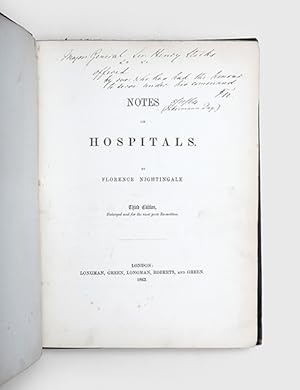About this Item
Presentation copy, inscribed by the author on the title page, "Major General Sir Henry Storks &c &c offered by one who has had the honour to serve under his command. F.N. 5/11/64 (Inkermann [sic] Day)". An excellent association copy: during the Crimean War, Henry Knight Storks (1811-1874) was in charge of the British establishments in Turkey, from the Bosphorus to Smyrna, and received the rank of major-general. He superintended the final British withdrawal from Turkey at the end of the war. Nightingale inscribed this copy on the ten-year anniversary of the Battle of Inkerman, a major British victory. Storks was a key ally for Nightingale's nursing reforms in the Crimea, which she often felt were hampered by the British military authorities, and she deemed him the only official who supported her. She wrote on 6 March 1856, "I have therefore fought my own battles. I can truly say unsupported by any official out here, with the exception of Genl. Storks" (in Goldie, p. 225). In May 1856 Nightingale was so exhausted by illness and overwork that she thought she was dying, and wrote to Storks with her last requests: "As you are of all those in office, whether at home or abroad, the officer who has given the most steady and constant support to the work entrusted to me by her Majesty's Government, I venture to appeal to you to continue that support after my death, and to carry out as far as possible my last requests" (ibid., p. 265). Nightingale recovered, and in 1857 had Storks appointed a member of the Royal Commission on the sanitary condition of the army. For many years after the pair continued to correspond on the welfare of the soldiers. Nightingale's Notes on Hospitals was first published in 1858, and the second edition in 1859. This third edition was completely revised and substantially expanded, and as Nightingale says in her preface, "it is in reality a new book". The work addresses sanitation and hospital architecture, arguing for the "pavilion" plan in which each hospital ward was composed of several wings to allow for air circulation and increased sunshine, as well as reducing infection rates by confining infectious patients to specific areas. The book "won Nightingale praise and inaugurated her career as an advisor to medical professionals all around the world, especially those involved with hospital and infirmary construction" (Orlando, Women's Writing in the British Isles). Bishop & Goldie 101. Sue Goldie, ed., Florence Nightingale: Letters from the Crimea, 1997. Quarto. With 13 folding plates (including map of London and of Paris) and 3 folding tables. Original purple cloth, spine lettered in gilt, covers decorated in blind, brown endpapers. Housed in custom red cloth solander box. Wear at extremities with loss at head of spine (not affecting lettering), splitting to front joint, inner hinges a little tender with slight splits, contents clean, plan of Paris with small chip to outer edge affecting border without loss to image. A good, unrepaired copy.
Seller Inventory # 161784
Contact seller
Report this item




